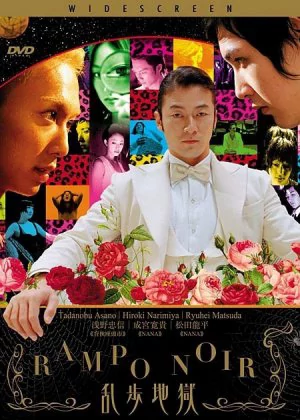Rampo Noir

Back when the Japanese horror scene was dominated by black-haired, female ghosts, draped in long white gowns, ever fuelling the regressing 'less is more' aesthetic, there was one project that rose from the stale ashes left by hundreds of rip-offs and wannabes. Rampo Noir [Rampo Jigoku] revitalized the Japanese horror genre and showed the world there was more than glitchy apparitions and cheap setups to scare and out-gross audiences.
![screen capture of Rampo Noir [Rampo Jigoku]](/thumbs/img/articles/1200xauto/rampo-noir-1.webp)
Rampo Noir is an anthology film based around the work of famous Japanese writer Edogawa Rampo. The man was a big fan of Edgar Allan Poe (and if you look closely, Edogawa Rampo is merely a Japanese re-pronunciation of Poe's name), his influence ever present in Rampo's work. Rampo's stories are a mix of the obscene, the perverse and the obscure, framed in stylish and well-composed settings. His stories are never about random killings or evil monsters, but about the deepest and darkest corners of the human mind which manifest itself in obsessive and creepy behavior, though often not ill-intended.
The film starts with the shortest (but probably most impressive) segment of the four. Mars Canal (Takeuchi Suguru) is a silent, narrative-less affair featuring the physical struggles of a man and woman. Those of you who are familiar with Chris Cunningham's video installation Flex will definitely recognize the setup, as this short is clearly inspired by Cunningham's work. There are also obvious differences though. Mars Canal is completely silent for the bigger part of its running time, which creates a very uneasy tension when you see the naked bodies writhing across the screen. Until the very end that is, when an ever growing wave of noise starts washing over the film. A very emotive and impressive form of audiovisual trickery that immediately sets the tone.
![screen capture of Rampo Noir [Rampo Jigoku]](/thumbs/img/articles/1200xauto/rampo-noir-2.webp)
The second short (Mirror Hell by Akio Jissoji) is the most traditional of the anthology. A very classic Japanese tale of horror (think Orochi) told in a very restrained and stylish way, even when the subject matter becomes quite gruesome at certain points. Mirror Hell is superbly shot, set in between an endless array of mirrors and reflecting surfaces. I don't think there is even a single shot that doesn't play with reflections. Tadanobu Asano and Hiroki Narimiya take up the lead roles, secondary support comes in the form of Susumu Terajima. Clearly there is no shortage of acting talent present here. A very nice introduction into the world of Rampo and a very stylish one to boot.
Hisayasu Sato tackles Rampo's Caterpillar (in 2010 Koji Wakamatsu made his own version of this tale). A sick and twisted story about a man with no legs and arms, held captive by his loving wife who basks in the glory of her husband's war efforts. Hanae Kan and Ryuhei Matsuda grace the screen with their presence, Ryuhei in particular is always a worthwhile addition to a film's cast. Caterpillar is easily the most disturbing and direct short of the anthology, resulting in some very disturbing and full-out gross imagery. Coupled with the expressive visual style this short is sure to leave quite an impression.
![screen capture of Rampo Noir [Rampo Jigoku]](/thumbs/img/articles/1200xauto/rampo-noir-3.webp)
Finally, there is Atsushi Kaneko's Crawling Bugs, a more cartoonesque short about the perverse obsession of a fan for a stage actress. Asano (once again) lands the job of his dreams when he is hired as his favorite actress' chauffeur. He develops an unhealthy fascination for the woman though and start to stalk her. The result is anything but pretty (not quite unlike Fabrice du Welz' short film A Wonderful Love) but quite a sight for horror enthusiasts. A wonderfully visualized short, brimming with energy and vision, leaving you with a fair few images burning on your retina when the credits finally close down this final act.
Rampo Noir is a daring project, bringing together a team of varied directors (two first-timers and two classics) and giving them carte blanche to adapt one of Rampo's stories. The result is an amazing collection of shorts, brought to life by superb actors and featuring strong and diverse styles. A true sight to behold and without a doubt one of the best Japanese horror projects around. Forget about the Ringus and Ju-ons of this world, Rampo Noir will show you the disturbing depths of the human mind enhanced with some rather plastic visions of human decay. It's the ultimate proof that horror and arthouse don't necessarily exclude each other.